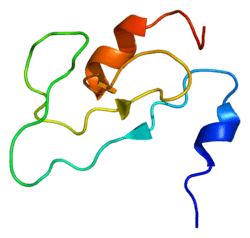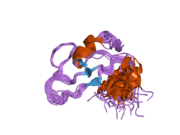RASSF5
Ras association domain-containing protein 5 is a protein that in humans is encoded by the RASSF5 or F5 gene.[5][6][7]
Function
This gene is a member of the Ras association domain family. It functions as a tumor suppressor, and is inactivated in a variety of cancers. The encoded protein localizes to centrosomes and microtubules, and associates with the GTP-activated forms of Ras, Rap1, and several other Ras-like small GTPases. The protein regulates lymphocyte adhesion and suppresses cell growth in response to activated Rap1 or Ras. Multiple transcript variants encoding different isoforms have been found for this gene.[7]
Interactions
RASSF5 has been shown to interact with RRAS,[8] RAP2A,[8] MRAS[8] and RASSF1.[8]
gollark: #include <stdio.h>printf("abcd\n");return 0;
gollark: !exe why
gollark: printf("abcd");return 42;
gollark: !exe why
gollark: How does one apply changes to a merged PR?
References
- GRCh38: Ensembl release 89: ENSG00000266094 - Ensembl, May 2017
- GRCm38: Ensembl release 89: ENSMUSG00000026430 - Ensembl, May 2017
- "Human PubMed Reference:". National Center for Biotechnology Information, U.S. National Library of Medicine.
- "Mouse PubMed Reference:". National Center for Biotechnology Information, U.S. National Library of Medicine.
- Yao R, Wang Y, You M (Apr 2002). "Chromosome mapping and sequence variation of the murine Ras effector gene Nore1". Cytogenetics and Cell Genetics. 95 (1–2): 126–8. doi:10.1159/000057035. PMID 11978988.
- Tommasi S, Dammann R, Jin SG, Zhang XF, Avruch J, Pfeifer GP (Apr 2002). "RASSF3 and NORE1: identification and cloning of two human homologues of the putative tumor suppressor gene RASSF1". Oncogene. 21 (17): 2713–20. doi:10.1038/sj.onc.1205365. PMID 11965544.
- "Entrez Gene: RASSF5 Ras association (RalGDS/AF-6) domain family 5".
- Ortiz-Vega S, Khokhlatchev A, Nedwidek M, Zhang XF, Dammann R, Pfeifer GP, Avruch J (Feb 2002). "The putative tumor suppressor RASSF1A homodimerizes and heterodimerizes with the Ras-GTP binding protein Nore1". Oncogene. 21 (9): 1381–90. doi:10.1038/sj.onc.1205192. PMID 11857081.
Further reading
- Kumari G, Singhal PK, Suryaraja R, Mahalingam S (Mar 2010). "Functional interaction of the Ras effector RASSF5 with the tyrosine kinase Lck: critical role in nucleocytoplasmic transport and cell cycle regulation". Journal of Molecular Biology. 397 (1): 89–109. doi:10.1016/j.jmb.2010.01.005. PMID 20064523.
- Vavvas D, Li X, Avruch J, Zhang XF (Mar 1998). "Identification of Nore1 as a potential Ras effector". The Journal of Biological Chemistry. 273 (10): 5439–42. doi:10.1074/jbc.273.10.5439. PMID 9488663.
- Ortiz-Vega S, Khokhlatchev A, Nedwidek M, Zhang XF, Dammann R, Pfeifer GP, Avruch J (Feb 2002). "The putative tumor suppressor RASSF1A homodimerizes and heterodimerizes with the Ras-GTP binding protein Nore1". Oncogene. 21 (9): 1381–90. doi:10.1038/sj.onc.1205192. PMID 11857081.
- Khokhlatchev A, Rabizadeh S, Xavier R, Nedwidek M, Chen T, Zhang XF, Seed B, Avruch J (Feb 2002). "Identification of a novel Ras-regulated proapoptotic pathway". Current Biology. 12 (4): 253–65. doi:10.1016/S0960-9822(02)00683-8. PMID 11864565.
- Vos MD, Martinez A, Ellis CA, Vallecorsa T, Clark GJ (Jun 2003). "The pro-apoptotic Ras effector Nore1 may serve as a Ras-regulated tumor suppressor in the lung". The Journal of Biological Chemistry. 278 (24): 21938–43. doi:10.1074/jbc.M211019200. PMID 12676952.
- Katagiri K, Maeda A, Shimonaka M, Kinashi T (Aug 2003). "RAPL, a Rap1-binding molecule that mediates Rap1-induced adhesion through spatial regulation of LFA-1". Nature Immunology. 4 (8): 741–8. doi:10.1038/ni950. PMID 12845325.
- Chen J, Lui WO, Vos MD, Clark GJ, Takahashi M, Schoumans J, Khoo SK, Petillo D, Lavery T, Sugimura J, Astuti D, Zhang C, Kagawa S, Maher ER, Larsson C, Alberts AS, Kanayama HO, Teh BT (Nov 2003). "The t(1;3) breakpoint-spanning genes LSAMP and NORE1 are involved in clear cell renal cell carcinomas". Cancer Cell. 4 (5): 405–13. doi:10.1016/S1535-6108(03)00269-1. PMID 14667507.
- Praskova M, Khoklatchev A, Ortiz-Vega S, Avruch J (Jul 2004). "Regulation of the MST1 kinase by autophosphorylation, by the growth inhibitory proteins, RASSF1 and NORE1, and by Ras". The Biochemical Journal. 381 (Pt 2): 453–62. doi:10.1042/BJ20040025. PMC 1133852. PMID 15109305.
- Irimia M, Fraga MF, Sanchez-Cespedes M, Esteller M (Nov 2004). "CpG island promoter hypermethylation of the Ras-effector gene NORE1A occurs in the context of a wild-type K-ras in lung cancer". Oncogene. 23 (53): 8695–9. doi:10.1038/sj.onc.1207914. PMID 15378027.
- Fujita H, Fukuhara S, Sakurai A, Yamagishi A, Kamioka Y, Nakaoka Y, Masuda M, Mochizuki N (Feb 2005). "Local activation of Rap1 contributes to directional vascular endothelial cell migration accompanied by extension of microtubules on which RAPL, a Rap1-associating molecule, localizes". The Journal of Biological Chemistry. 280 (6): 5022–31. doi:10.1074/jbc.M409701200. PMID 15569673.
- Nakamura N, Carney JA, Jin L, Kajita S, Pallares J, Zhang H, Qian X, Sebo TJ, Erickson LA, Lloyd RV (Sep 2005). "RASSF1A and NORE1A methylation and BRAFV600E mutations in thyroid tumors". Laboratory Investigation. 85 (9): 1065–75. doi:10.1038/labinvest.3700306. PMID 15980887.
- Foukakis T, Au AY, Wallin G, Geli J, Forsberg L, Clifton-Bligh R, Robinson BG, Lui WO, Zedenius J, Larsson C (Mar 2006). "The Ras effector NORE1A is suppressed in follicular thyroid carcinomas with a PAX8-PPARgamma fusion". The Journal of Clinical Endocrinology and Metabolism. 91 (3): 1143–9. doi:10.1210/jc.2005-1372. PMID 16352687.
- Moshnikova A, Frye J, Shay JW, Minna JD, Khokhlatchev AV (Mar 2006). "The growth and tumor suppressor NORE1A is a cytoskeletal protein that suppresses growth by inhibition of the ERK pathway". The Journal of Biological Chemistry. 281 (12): 8143–52. doi:10.1074/jbc.M511837200. PMID 16421102.
- Macheiner D, Heller G, Kappel S, Bichler C, Stättner S, Ziegler B, Kandioler D, Wrba F, Schulte-Hermann R, Zöchbauer-Müller S, Grasl-Kraupp B (Jul 2006). "NORE1B, a candidate tumor suppressor, is epigenetically silenced in human hepatocellular carcinoma". Journal of Hepatology. 45 (1): 81–9. doi:10.1016/j.jhep.2005.12.017. PMID 16516329.
- Ishiguro K, Avruch J, Landry A, Qin S, Ando T, Goto H, Xavier R (Oct 2006). "Nore1B regulates TCR signaling via Ras and Carma1". Cellular Signalling. 18 (10): 1647–54. doi:10.1016/j.cellsig.2006.01.015. PMC 3204664. PMID 16520020.
This article is issued from Wikipedia. The text is licensed under Creative Commons - Attribution - Sharealike. Additional terms may apply for the media files.





